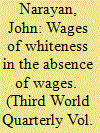| Srl | Item |
| 1 |
ID:
182655


|
|
|
|
|
| Summary/Abstract |
The past ten years have witnessed a revival in scholarship on militarism, through which scholars have used the concept to make sense of the embeddedness of warlike relations in contemporary liberal societies and to account for how the social, political and economic contours of those same societies are implicated in the legitimation and organization of political violence. However, a persistent shortcoming has been the secondary role of race and coloniality in these accounts. This article demonstrates how we might position racism and colonialism as integral to the functioning of contemporary militarism. Centring the thought and praxis of the US Black Panther Party, we argue that the particular analysis developed by Black Panther Party members, alongside their often-tense participation in the anti–Vietnam War movement, offers a strong reading of the racialized and colonial politics of militarism. In particular, we show how their analysis of the ghetto as a colonial space, their understanding of the police as an illegitimate army of occupation and, most importantly, Huey Newton’s concept of intercommunalism prefigure an understanding of militarism premised on the interconnections between racial capitalism, violent practices of un/bordering and the dissolving boundaries between war and police action.
|
|
|
|
|
|
|
|
|
|
|
|
|
|
|
|
| 2 |
ID:
155139


|
|
|
|
|
| Summary/Abstract |
In November 1970, Black Panther Party leader Huey P. Newton gave a lecture at Boston College where he introduced his theory of intercommunalism. Newton re-articulated Marxist theories of imperialism through the lens of the Black liberation struggle and argued that imperialism had entered a new phase called ‘reactionary intercommunalism’. Newton’s theory of intercommunalism offers nothing less than a proto-theorisation of what we have come to call neo-liberal globalisation and its effects on what W. E. B. Du Bois had seen as the racialisation of modern imperialism. Due to the initial historical dismissal of the Black Panther Party’s political legacy, Newton’s thought has largely been neglected for the past 40 years. This paper revisits Newton’s theory of intercommunalism, with the aim of achieving some form of epistemic justice for his thought, but also to highlight how Newton’s recasting of imperialism as reactionary intercommunalism provides critical insight into the rise of Trumpism in the US.
|
|
|
|
|
|
|
|
|
|
|
|
|
|
|
|